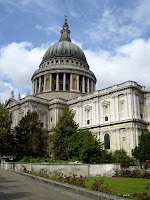Surprisingly, despite the language similarity, London is the most foreign of the cities I have visited on this trip. True, it's easy to ask for directions. And I can insist on student discount with confidence, not to mention in grammatically correct sentences. Perhaps what's foreign isn't the landscape, but rather my own role, that of a tourist. I didn't know anything about London, and in fact, I w alked past Big Ben the first day (and took a picture of it!) without ever realizing what it was. Nothing about London itself quite connected for me as I wandered its patchwork of old and new.
alked past Big Ben the first day (and took a picture of it!) without ever realizing what it was. Nothing about London itself quite connected for me as I wandered its patchwork of old and new.
In the end, everything was too expensive. Even getting into heaven costs money these days; St. Paul's Cathedral charged an exorbitant 9£ ($18!), while its frosted-glass door proclaimed that "This is none other than the house of God. This is the gate of Heaven" which seemed to be a return to the times when the church sold indulgences (or did we ever leave that time?). I decided I was satisfied standing on its threshold looking into heaven.
In the end, everything was too expensive. Even getting into heaven costs money these days; St. Paul's Cathedral charged an exorbitant 9£ ($18!), while its frosted-glass door proclaimed that "This is none other than the house of God. This is the gate of Heaven" which seemed to be a return to the times when the church sold indulgences (or did we ever leave that time?). I decided I was satisfied standing on its threshold looking into heaven.
I stumbled across two new places that I loved (and they didn't charge me--although I did make donations). I went to the British Museum because I thought the Magna Carta was there, and stumbled across the Rosetta Stone instead! Eventually, I did find the Magna Carta at the British Library, along with
So, 6 Starbucks, 10 pictures sneaked in at Westminster Abbey, half of a Rosetta Stone, and a changing of the guards later, I still feel like a stranger. But maybe that's a good thing since familiarity breeds complacency as I discovered upon my return to Seattle. Being in Rome